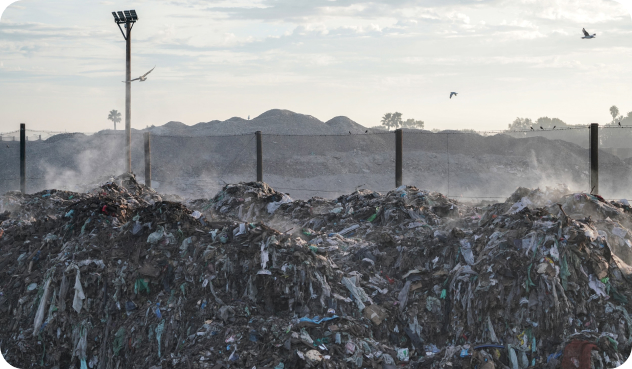Industrial Composting vs. Home Composting: What You Need to Know

Content
- Understanding Composting and Compostable Products
- What Is Home Composting?
- Key Differences Between Home and Industrial Composting
- Understanding Compostable Certification
- Composting Infrastructure and Access
- Why Most Packaging Needs Industrial Composting
- Composting for Businesses and the Foodservice Industry
- How Greenprint Supports Sustainable Foodservice
- Partner With Greenprint for Certified Compostable Solutions
Plastic pollution is a worldwide crisis, with plastics contaminating oceans, waterways, and even entering the food chain. Although recycling efforts have improved over the years, 85% of recyclable plastics remain in landfills. A promising solution for individuals and businesses seeking to help the environment is composting at home and in industrial facilities. Using and properly disposing of compostable packaging and food serviceware can be eco-friendly alternatives to oil-based single-use plastics. Understanding the fundamentals of composting can better prepare you to make informed choices for your home, business, or restaurant.
Understanding Composting and Compostable Products
Composting is the natural degradation process of organic materials, like yard waste and food scraps, into nutrient-rich soil. This process relies on bacteria, fungi, insects, and sometimes worms, all working together to decompose organic matter. Composting reduces landfill waste, lowers greenhouse gas emissions, and supports healthy soil.
Whether composting at home or in commercial settings, composting provides a practical way for people to make a positive environmental impact. Compostable bioplastics made from plant fibers like sugar cane, agave, and cornstarch are designed to break down through composting, returning nutrients to the soil and leaving no toxic residue.
However, not all products labeled “compostable” are created equal. Some products require very specific conditions to break down, and only certified compostables are guaranteed to break down safely and completely under composting conditions. Certification confirms compostable products meet the requirements for breakdown and safety and provides peace of mind about their actual environmental impact.
What Is Home Composting?
Home composting is the process of turning everyday kitchen scraps and yard waste into nutrient-rich compost using a backyard bin, tumbler, pile, or even worm bin. Products that are home compostable can decompose at lower, fluctuating temperatures and under less controlled conditions than industrial composting. The ideal composting environment for microorganisms includes carbon, nitrogen, oxygen, and water in specific ratios. For home composting, the most common organic waste types to be composted fall into either “green” (nitrogen-rich) or “brown” (carbon-rich) categories:
- Green (nitrogen-rich) materials:
- Fruit and vegetable scraps (no meat, fish, or bones)
- Coffee grounds and filters, tea leaves and bags (just be sure to remove any staples from the tea bags)
- Lawn clippings, weeds (not gone to seed), flowers
- Brown (carbon-rich) materials:
- Cardboard, newspaper, shredded paper
- Straw, hay, twigs, leaves
- Sawdust, wood chips, wood ash
- Nut shells, dry pasta, cotton balls
With proper care, home composting is easy, low-cost, and odor-free. However, most compostable packaging and bioplastics are unsuited for home composting, as they require industrial composting to break down fully.

What Is Industrial Composting?
Industrial composting is a large-scale managed process at commercial facilities designed to handle high volumes of organic waste and certified compostable products. Unlike home composting, these facilities maintain controlled conditions, including high heat, active aeration, and regular turning, to facilitate complete degradation of the organic matter.
The carefully maintained environment of industrial composters means that they can accept a broader range of materials for decomposition, including:
- Certified compostable packaging (BPI, EN 13432, or ASTM D6400 compliant)
- Bioplastics, including PLA cups, cutlery, and takeout containers
- Food-soiled disposables
- Meat, fish, bones, dairy, and oils
Home composters cannot reach the high temperatures necessary to break down these materials, so it is essential to use curbside or commercial composting programs for them. Industrial composting enables these products to degrade safely and efficiently, supporting sustainability goals for both individuals and businesses.

Key Differences Between Home and Industrial Composting
The primary difference between the two main types of composting is the temperature maintained. Industrial composting maintains an environment at 55-70°C (131-158°F), while the process of home composting is based on ambient temperatures. While products that are home compostable, meaning, simple organics like kitchen scraps, coffee grounds, and yard waste, can be processed with industrial composting equipment, certified compostable packaging, bioplastics, and food-soiled disposables are commercially compostable only.
Industrial composting takes weeks to a few months, whereas home composting can take up to a year to completely decompose organic matter. Products labeled as “industrially compostable,” such as certified compostable food service ware and bioplastic bags, require the high temperatures and measured inputs of oxygen, water, nitrogen, and carbon-rich materials of industrial setups.
Which is better when comparing industrially compostable products vs. home compostable products? The answer depends on a few factors. Industrial compostable products are designed to be commercially compostable, and they are composed of a wider range of materials that can support more applications, including food service ware. Home compostable products are suitable for backyard composting but are limited to less complicated plant-based materials. Your best option will depend on your waste stream and local composting infrastructure.
Understanding Compostable Certification
While compostable products are made with materials that degrade under composting, anaerobic digestion, or other natural processes, certified compostable products are independently tested and verified to degrade according to rigorous standards like the ASTM D6400 standard. Institutions like the Biodegradable Products Institute (BPI), TUV Austria, and the Compost Manufacturing Alliance are third-party field testing certifiers holding manufacturers accountable for compostability claims.
To be certified, the compostable products must be reliably home or industrial compostable, meaning that they pass rigorous testing for disintegration, biodegradation, heavy metal content, and ecotoxicity. Choosing certified compostable products mitigates the risks of greenwashing and ensures only truly compostable products are labeled as such. Certification also supports compliance with local and regional waste management regulations and helps businesses and consumers make informed, ethical choices.
Composting Infrastructure and Access
Access to composting options varies by region—urban areas are likelier to have industrial composting facilities nearby. You can find information on your composting options by checking with your local government or waste disposal service provider, or using directories from BPI or the U.S. Composting Council. If you don’t have access to industrial composting, there are other waste reduction strategies like using reusable products, recycling, or food donation programs. To make sure your efforts have the intended environmental impact, always confirm your local composting options before switching to compostable products or packaging.
Why Most Packaging Needs Industrial Composting
Most types of compostable food packaging, like PLA-lined cups, cutlery, and fiberware takeout containers, are designed for industrial composting. Home composters are unable to reach the high temperatures needed to fully degrade these materials—and if they were to end up in a home compost bin, they would either contaminate the finished compost or persist for years to come.
Certified compostable products can biodegrade fully and support sustainability goals. Proper disposal of these products—with an industrial composting facility—is essential to realizing the environmental benefits of using compostable packaging.
Composting for Businesses and the Foodservice Industry
Sustainability isn’t just a buzzword—it’s a business mandate. Companies across all industries are facing calls to adopt more environmentally sustainable practices, and composting is a practical and impactful way to reduce waste, comply with regulations, and improve brand reputation. Restaurants and the broader foodservice industry face even steeper stakes, with food and packaging waste making up a significant portion of daily operations, and with customers actively seeking establishments with demonstrable sustainability credentials.
With local and regional municipalities enacting single-use plastic bans and mandating the use of compostable packaging, businesses are increasingly prioritizing sourcing certified compostable products. Since the FTC monitors environmental marketing claims under “truth in advertising” laws, regulatory compliance reduces legal risk and streamlines waste sorting for staff and customers.
To fully take advantage of all the benefits of composting for your business:
- Choose BPI or equivalent-certified compostable products and match material properties (heat resistance, moisture barrier, durability) to your menu and operational needs.
- Train staff to sort waste correctly to avoid contamination, and use clear signage and menu notes to educate customers.
- Ensure your packaging is accepted in local composting facilities by working with suppliers and composting partners—Greenprint can help connect you with the necessary resources.
By adopting composting as a cornerstone of your sustainability strategy, your business can be a leader in environmental responsibility and consumer trust.
How Greenprint Supports Sustainable Foodservice
Greenprint manufactures a growing catalog of environmentally friendly, internationally certified products. Our mission is to eliminate the demand for oil-based single-use plastics through the production of third-party certified plant-based foodservice ware. We can help you navigate the regulatory landscape, connect with composting partners, and provide ongoing support for your eco-friendly journey. Greenprint is your partner in building a more compliant, successful, and sustainable foodservice business.
Partner With Greenprint for Certified Compostable Solutions
When you partner with Greenprint, you gain access to a wide range of BPI-certified and internationally recognized compostable packaging options tailored to meet the needs of foodservice operations. Our team helps you navigate compostable certifications, regulations, and best practices so that you can pursue your sustainability goals with confidence. We also verify that your packaging aligns with local and regional composting requirements, and we support staff training, customer education, and waste stream optimization for maximum composting success.
Ready to see the Greenprint difference? Browse our collection of certified compostable solutions or request a free consultation, and take the next step toward a more sustainable future.
